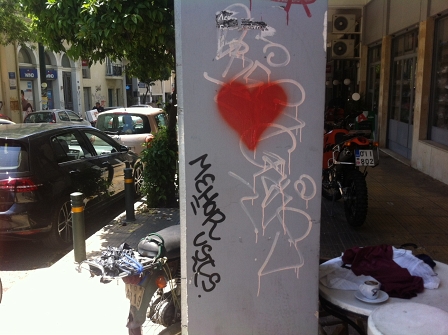Erstellt am: 17. 6. 2015 - 16:00 Uhr
"Bound together in a conflict"
- Golden-Dawn-Anhänger im Athener Arbeiterviertel Kypseli: "These people who go there, they are not readymade fascists. They are people who are hungry."
Die Krise in Griechenland hat nicht nur soziale und wirtschaftliche, sondern auch politisch brisante Auswirkungen: die extreme Rechte ist im Aufwind. Zur drittstärksten Kraft wurde bei den Parlamentswahlen Ende Jänner die offen neonazistische Partei "Chrysi Avgi" (Griechisch für "Goldene Morgenröte") gewählt. Für den englischen Bürgerrechtler Kevin Ovenden ("Unite Against Fascism"), der die Entwicklungen in Athen seit Jahren beobachtet, ist das keine Überraschung. Er bezeichnet das europaweite Erstarken von Nationalismen und das bisher ergebnislose Gezerre um eine gemeinsame Antwort auf die Asylkrise als Eskalation jahrelanger Fehlentwicklungen.
In a recent keynote, you mentioned an example for structural creation of "otherness" within Europe. Can you elaborate on that?
I remember that some years ago, the frontpage of an Austrian tabloid newspaper similar to German "Bild" read "Griechen raus". Which was not even "Griechenland raus" or "Greece out of the Eurozone", which would have been a "political statement", but "Griechen" which means of course "Greeks". I know Austria, Vienna reasonably well. Many Greek workers came to Austria and West Germany in the 1960s and 1970s. And it is the kind of headline which no editor of a German publication could allow to pass without knowing that this had certain connotations – certain echoes of the past, what to me indicates that far from national chauvinist tensions being reduced through the introduction of the Euro, instead we have seen an acceleration of national chauvinism. The promise of Europe has been, for more than 50 years, a lowering of national tension, "never again will we have the national conflicts which led to war twice in the last century". In the last 15 years, we have seen a reversal of that. There is a heightening of national tension. And you find it in "official" European politics: the ease with which mainstream politicians turn to national chauvinist explanations for the crisis in the Eurozone. This is very dangerous. It's a sign of historical regression; that far from there being deeper integration of people there is now greater separation. It's a process which we have to stop.
G. Mair
It is by some being argued that the establishment of the "Schengen zone" implicitly defined a root cause of what is coming to the surface right now (with the "migration crisis"): the constitution of an "Other", that outside of the Schengen zone...
Yes, I also think that it did do that. The process of the freedom of establishment, the freedom of movement within Europe/the Schengen area was predicated upon greater and greater restriction for people coming into Europe. The Lisbon and Dublin treaties meant that for example people arriving in Greece applying for asylum had to apply at their point of entry (into EU). The points of entry into Europe are of course in the South – the (Italian) island of Lampedusa, the (Spanish) Balearic islands, across the mediterranean between Turkey and Greece and so on. These are the areas which are hardest hit by the economic crisis as well. I think that the Schengen process involved the creation of an "Other" and also that the Schengen process is now breaking down. There is now talk increasingly of the reintroduction of borders, the accession of Rumania and Bulgaria was met with a restriction upon the freedom of movement, freedom of association, the freedom of establishment and so on. This is I think an indication of what's happening around Europe: far from Europe being an expansive, a liberal idea, it is becoming an narrower and chauvinist idea.
What could have been done differently in your opinion – when establishing the Schengen zone for example? Because establishing an area that is meant to be expanding for people to freely move around isn't a bad idea from the start, right?
I think this really goes to one of the contradictions at the heart of the European Union which is that it is an association of nation states – so that the idea of Europe transcends nation states, but we don't have a single European nation state – we have a collection of nation states. And so, the European process, particularly in the cause of the crisis since 2008, has meant that you have an arena where nation states are bound together, but bound together in a conflict.

ORF Radio FM4 | Johanna Jaufer
Because there is no fiscal union?
Exactly, there is no fiscal union, so at the level of identity, what we were promised in the early 2000s, was that people would gradually move to a "hyphenated identity": "I'm a European-German", "I'm a European-French", "a European-Greek"... Well, the hyphen was very, very weak – because the European identity: what is there to identify with? Increasingly, it's a battle ground between different national interests; because the debts now belong on a nation state basis, the tax and spend policy is on a nation state basis, the state bearing down upon people with an authoritarian pressure is on a nation state basis, and so what you have in the Eurozone is not something that can attract any kind of political allegiance. The political allegiance is to the nation states, and this is in conflict.
Also the discussions between Greece and its Eurozone partners are kind of ruled by the "power of the strongest"...
I think what's happening is that for forty years, there has been a narrative of Europe which had some kind of progressive consent. People could believe in it. Europe meant "no more war". Europe meant a guarantee of individual liberties. Women's rights were guaranteed by Europe, labor rights and so on. Now for the first time, since the inception of the European Union, there is no progressive narrative of the European Union: Austerity; national chauvinist conflicts; it's not promising the rule of law into prosperity or anything like this. This is why there is a particularly sharp reaction against the Greek government. Because the Greek government is posing an alternative and it's not like they have an argument against it. The only argument is "there can't be an alternative".
Like "there can't be an argument!?"
"There can't be an argument – we will crush the idea". This is why they don't just want to defeat Athens – they want to crush Athens. They want to crush the idea of an alternative. That's the rationale behind the Schäuble position, it's not just vindictive.

ORF Radio FM4 | Johanna Jaufer
Talking to people from my parents' generation, people in their mid-/end-50s living in Northern Europe, they often remember growing up in the "Golden Times": All the optimism and peace that came with being well-fed, having better perspectives and a little more money every year: Doesn't that whole mindset simply stem from an upbringing in a stable financial environment – and does it also prevent people from having to take position – I mean, everyday life in the 70s was often a lot more racist, misogynist etc.?
Hintergrund
Spiegel.de: Zweiter Weltkrieg, Bürgerkrieg, Militärjunta in Griechenland: Konflikte und Kräfteverhältnisse der jüngeren Vergangenheit
Yes. But there was generally a feeling that things will progress economically. Your children, grandchildren would be better-off. And also that there would be a greater sense of freedom. In this country (Greece), the idea of its membership of the European Union was a guarantee against the return of authoritarian rule. In fact, it was the European Union which pushed for Greece to have its first unelected prime minister since the Junta in 2011. Because the elected prime minister George Papandreou couldn't be relied upon to push through the Austerity memorandum – so they created a government of Lucas Papademos who was an unelected prime minister. So, all of these things I think are going into reverse and there's a real sense across Europe – particularly amongst young people – that you can't expect things to get better. And that poses some very sharp questions about the political future and alternatives. You see that here in Greece people talk of a "Lost Decade" like the Japanese lost decade. A lost decade, if you are in your twenties, is not "ten years of flat economic activity", it's your lack of life. And it doesn't come back. Because if you don't have a job in your twenties, that's cumulative.
Referring to a "lost decade", economist Joseph Stiglitz often puts forth a similar argument: that in all the measurements and statistics saying that austerity doesn't work, that it creates fear and also sickness, something often tends to be overlooked: the insecurity that comes with young people's life during crisis. Without austerity, in prospering surroundings, you would start working in your early twenties, gain life and work experience and that will make you eligible for an even better job later on. Stiglitz argues that austerity also takes away this very kind of security – it's not only about not having a job, it's also about not having a better job later on or the opportunity to raise children.
"They sounded like the mainstream"
Die Neonazipartei "Goldene Morgenröte" hat Griechenlands Bevölkerung jahrelang terrorisiert. Jetzt steht die Parteiführung vor Gericht. Woher kommen "Chrysi Avgi" und was erwarten sich Beobachter vom Prozess?
And so, people make decisions in their twenties to restrict their life. I think that all of this is true. And I think that this is not going to go away with even just a small uptick in the economy. This is something that is now built into the young people across Europe: 50 percent youth unemployment in the Spanish state, 55 percent inside of Greece; a larger number of unemployed all over the continent. The period in which there would seem to be a progressive European narrative we'll look back on as a short period. The other thing that is happening is that the right is increasingly radicalized in these politics. The civilized right is gone. You increasingly have a more feral, wild, untamed right – manifest in different political parties: the "Alternative für Deutschland" breaks away to the right of Christian Democracy, moving further to the right. So I think this is what we’re going to see, and it’s opening up really good questions we need for radical politics.
They do come from the experience of struggle – is that what we learn from this crisis?
Yes. The rise of a radical political alternative in Greece is inseparable from the Greek struggle. Similarly, Podemos in the Spanish state is inseparable from the Indignados movement. We are beginning to see this struggle taking place across Europe. In Germany now you have the major train strike and the strike by kindergarden workers – there is quite a big level of social resistance beginning in Germany, and I hope that this develops elsewhere, as well.
Weiterlesen
- 5 minutes with Philippe Le Grain: "The Eurozone has become a glorified debtors’ prison"
- Studie, science.ORF.at: Prekäre Jobs verhindern Nachwuchs
- 2011, ZEIT.de: "Papademos im Amt, Regierung steht"


